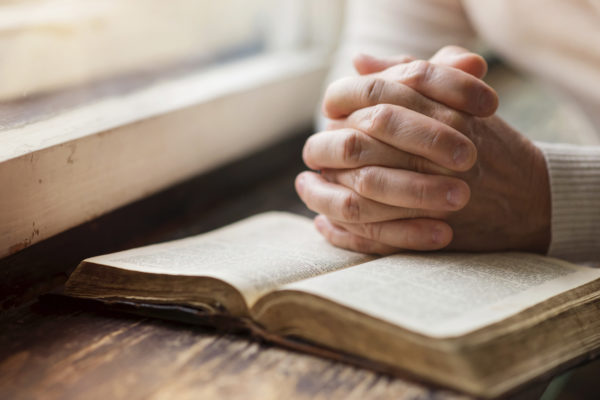Called to minister to God (1)

By Femi Aribisala
Does anything upset God? Yes indeed! God is upset many times in the scriptures, according to the prophets. He is upset a lot because we upset Him. Jesus was so upset about Jerusalem that He wept over the city. He was so upset that He wept at the grave of Lazarus.
What is the one thing that must be upsetting God at this very moment? I am convinced it must be the coronavirus pandemic. Yes, God himself must have sent the coronavirus into the world. But that is because He had no choice but to send it.
There is coronavirus today because Adam disobeyed God. Therefore, we, the offspring of Adam, have to learn obedience by the things we suffer. The COVID-19 pandemic is designed to teach us a lesson.
Nevertheless, God must be very upset that so many people are suffering and dying. However, He has already done what He intends to do about this. He sent Jesus as the Saviour of the world.
Royal priesthood
Jesus: “washed us from our sins in His own blood, and has made us kings and priests to His God and Father.” (Revelation 1:5-6). We are then required to minister to God and offer Him solace in His distress at the pains and sufferings of the world.
In the Old Testament: “The Lord separated the tribe of Levi to bear the ark of the covenant of the Lord, to stand before the Lord to minister to Him.” (Deuteronomy 10:8-9). However, the Levites were derelict in this duty, therefore, God rejected them. He then assigned this duty to Samuel; who was an Ephraimite and not a Levite: “The child (Samuel) ministered to the Lord before Eli the priest.” (1 Samuel 2:11).
But Israel rejected Samuel by asking for a king. So, God looked for priests to minister to Him among the general populace. Therefore, He says: “He whose walk is blameless will minister to Me.” (Psalm 101:6). Even those outside the commonwealth of Israel became acceptable: “The foreigners who join themselves to the Lord, (will) minister to Him” (Isaiah 56:6).
Jesus presents God’s dissatisfaction with the Levites and priests of the Old Testament in His parable of the Good Samaritan. A man traveling from Jerusalem to Jericho was attacked, robbed, and left half-dead on the road: “A certain priest came down that road. And when he saw him, he passed by on the other side. Likewise, a Levite, when he arrived at the place, came and looked, and passed by on the other side.” (Luke 10:31-32).
The only person who helped him and took care of him was a Samaritan. Therefore, Jesus came to establish a new priesthood of Good Samaritans as opposed to Levites and priests. That new priesthood is the Body of Christ, comprising those who have accepted Jesus as their Lord and Saviour.
Thus, Peter says to believers: “You are a chosen generation, a royal priesthood, a holy nation, (God’s) own special people, that you may proclaim the praises of Him who called you out of darkness into His marvelous light.” (1 Peter 2:9).
God’s ministers
But there is a problem. Many Christians who are called as priests to minister to God have not been operating according to this calling. Most do not even know what ministering to God entails. As a result, we have been remiss in this solemn duty.
Catholics have created even more confusion by establishing another special category of believers that they also call “priests.” These priests are not all men but only a select few. They are appointed by men and not God. They are exclusively men and do not include any women.
READ ALSO: ‘I will not rest in prayers until rapists are brought to justice’ – Adeboye
However, Jesus’ royal priesthood includes ALL believers. It comprises men as well as women. Unlike Catholic priests who only minister to men, Jesus’ royal priests minister first and foremost to God.
When we minister to someone, we take care of him and attend to his needs. But does God have needs? Does God need anything? The scriptures affirm that He does not:
“God, who made the world and everything in it, since He is Lord of heaven and earth, does not dwell in temples made with hands. Nor is He worshiped with men’s hands, as though He needed anything, since He gives to all life, breath, and all things.” (Acts 17:24-25).
In the Old Testament, the priests sacrifice bulls and goats and pour the blood on the altar.
But God insists He does not need their bulls and the blood of their goats: “If I were hungry, I would not tell you; for the world is Mine, and all its fullness. Will I eat the flesh of bulls, or drink the blood of goats?” (Psalm 50:12-13).
But although God does not have needs, He has wishes. He also has desires. So, what does God desire? Jesus says: “I desire mercy and not sacrifice.” (Matthew 9:13).
God desires mercy because: “It is not possible that the blood of bulls and goats could take away sins. Therefore, when He (Jesus) came into the world, He said: “Sacrifice and offering You did not desire, but a body You have prepared for Me.” (Hebrews 4:4-5).
Instead of a sacrifice, God prepared a body for Jesus. Instead of a sacrifice, the body of Christ was offered. What is the body that God prepared for Jesus? What is the body that is the acceptable sacrifice? We, the new creation in Christ Jesus, are that body.
Thus, Paul says to Christians: “You are the body of Christ, and members individually.” (1 Corinthians 12:27). “I beseech you therefore, brethren, by the mercies of God, that you present your bodies a living sacrifice, holy, acceptable to God, which is your reasonable service.” (Romans 12:1).
God’s thirst
What does God desire from the body of Christ?
God is thirsty. On the cross: “Jesus, knowing that all things were now accomplished, that the Scripture might be fulfilled, said, ‘I thirst!’” (John 19:28). God wants us to give Him water to drink: “A woman of Samaria came to draw water. Jesus said to her, ‘Give Me a drink.’” (John 4:7).
What kind of water does God drink? Only the living water of righteousness can satiate God’s thirst. Jesus says: “Blessed are those who hunger and thirst for righteousness, for they shall be filled.” (Matthew 5:6).
God thirsts for righteousness. But there is no water like that in the world. For this reason, the psalmist was dying of thirst, saying: “O God, You are my God; early will I seek You; my soul thirsts for You; my flesh longs for You in a dry and thirsty land where there is no water.” (Psalm 63:1).
However, believers today are the royal priesthood of the New Testament. Thanks to Jesus, we now have the living water of righteousness. We received it when we answered Jesus’ invitation: “If anyone thirsts, let him come to Me and drink. He who believes in Me, as the Scripture has said, out of his heart will flow rivers of living water.” (John 7:37-38).
Therefore, the body of Christ, the priesthood of the New Testament, can give God water to drink because we have received from Jesus the living water of the Holy Spirit.
CONTINUED
The post Called to minister to God (1) appeared first on Vanguard News.

No comments: